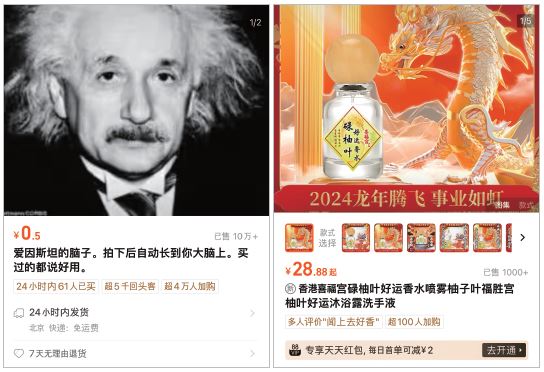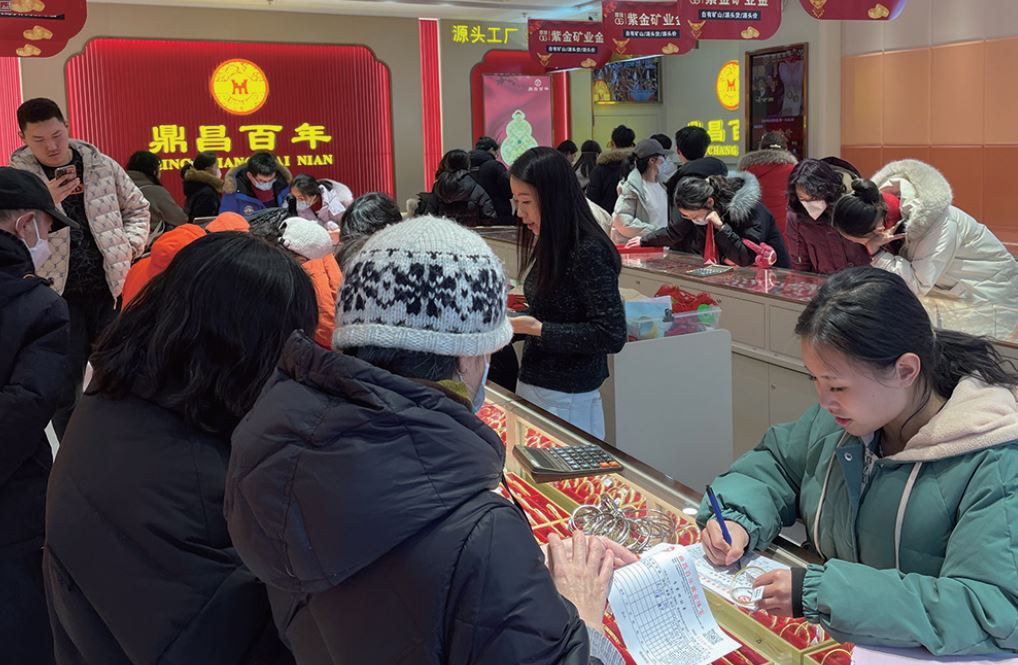 |
| Virtual emotional products being sold on Taobao, China's largest e-commerce platform. ‘Einstein’s Brain (left)’, which is said to make you smarter if you just buy it, and ‘Lucky Mist’, which is said to bring good luck. photo taobao |
“Einstein’s brain, if you just cheat, you automatically become smarter. Give it a try. Our motto is ‘Intellect is Gamcheon (心誠則靈)’. Give it a try. You must purchase it at least two days before taking an exam to see the results. However, do not use it for English-related tests. “Einstein was weak in English.”
'Einstein's Brain', sold on Taobao, China's largest e-commerce platform, is a virtual product priced at 0.5 yuan (about 95 won), and you cannot receive the product even if you pay. Nonetheless, the response is explosive. More than 100,000 units have been sold to date, and it was selected as one of Taobao's top 10 products last year. The main customer base is high school and college students who are about to take exams. There were also numerous humorous user reviews posted, such as “After buying Einstein’s brain, I passed the test by two points over the 60-point passing line” and “I can use it even though I barely have a brain.”
Young Chinese people, tired of fierce competition due to economic slowdown and high unemployment, have fallen in love with virtual products that provide emotional stability. While pursuing cost-effectiveness and moderating consumption as much as possible, people open their wallets for virtual products such as these, and a new consumption trend called 'emotional economy' has emerged in China. However, since there is no actual product even though money has been paid, there is a possibility that it could be interpreted as fraud, raising concerns that it is in a blind spot in protecting consumer rights and interests.
On April 11, Gongren Daily reported, “Recently, various virtual emotional products have been gaining popularity on major e-commerce platforms.” Virtual products are broadly divided into three types: From the blessing type, such as Einstein's Brain, which is said to improve your brain if you buy it, and the 'Lucky Mist,' which is said to bring good luck, to the entertainment type, such as 'Virtual Mosquito,' which is said to harass the seller if you tell the seller the messenger ID of the person you hate, to the seller. There are also healing types, such as 'Soul Tree Knot', which allows you to talk about your worries, and 'Affection Brain Removal', which is said to cure the pain of broken heart.
Most buyers of these products are known to be Generation Z (born between 1997 and 2010). They are exposed to increasingly fierce competition for entrance exams and employment. Chinese media analyzes that the act of purchasing virtual products creates a positive psychological state and relieves stress. Guan Zhen, a professor of social psychology at Nankai University, said, “These days, when the pace of life is accelerating and choices are becoming more diverse, young people are bound to experience confusion and anxiety due to conflict of values,” and added, “They are looking for psychological comfort and emotional outlets in virtual emotional products.” .
As virtual emotional products became popular, the term ‘emotional economy’ was coined. According to Fengpai Newspaper, the current emotional consumption market in China is worth at least 100 billion yuan (about 18.96 trillion won). Professor Kwan said, “Emotional value has become an important factor that cannot be ignored in the current consumption trends of young people.” He added, “Young people are pursuing the maximization of emotional value, and companies are engaging in bold innovation to discover emotional resources. In other words, the ‘emotional economy’ that the demand and supply sides are cultivating together is constantly creating new consumption scenarios,” he said. In fact, according to the '2023 Youth Consumption Survey', 49.3% of respondents answered that the reason for their purchase decision was because the product or service provides emotional value to them.
"Emotional value has become an important factor that cannot be ignored in the current consumption trends of Chinese youth. Young people are pursuing the maximization of emotional value, and companies are engaging in bold innovation to discover emotional resources. That is, the demand side and “The ‘emotional economy’ that the supply side is cultivating together is constantly creating new consumption scenarios.”
However, as virtual products are selling like hot cakes, voices of concern are emerging in China. First, there is an opinion that young people need healthy ways to relieve stress. You can temporarily relieve anxiety and gain stability by purchasing these products, but if you have emotional problems serious enough to rely on them too much, you should seek professional help.Warnings are also being issued to sellers. Chen Zhongyun, a professor at China University of Political Science and Law, said, “Explanations such as saying that Einstein’s brain will automatically grow in your body just by purchasing it may cause misunderstanding in some people,” adding, “Especially for elementary school students who still lack discernment, they may not believe this to be true. “And in this case, it is false advertising,” he said. Attorney Xiongqiao of Beijing Jinx Law Office also expressed concern, saying, “As there are no clear regulations on virtual emotional products, sellers may use brands and copyrights without permission, and content that violates social order may be included.”
Furthermore, some point out that regulations are necessary as sellers are earning large sales by providing intangible emotional value. Market analyst Ryu Hwan said, “Sellers of virtual emotional products are seriously promoting effects such as improved intelligence to encourage consumers to pay,” and added, “Their actions should be regulated by law.”
Chinese youth emerges as a ‘big hit’ in the gold market due to future anxiety
“Strong will to save…” “Accumulate wealth by finding a balance between risk and return”
 |
| Last February, the inside of a gold jewelry store on the first floor of Wanto Jewelry City, the largest jewelry wholesale and retail center in Beijing, China, was crowded with people looking to purchase gold. Photo by Reporter Yunjeong Lee |
Chinese youth have emerged as a ‘big hit’ in the gold market. It is analyzed that as anxiety about the future increases due to the economic slowdown amid endless competition for school and employment, people are paying attention to gold, which can be invested more safely.
According to the China Gold Association and local media, the size of China's gold products market last year was 518 billion yuan (about 98.2128 trillion won), growing 26% compared to the previous year. In terms of consumption, it was 1089.7 tons, an increase of nearly 9% from a year ago.
The growth of China's gold market is being driven by young people. According to Zhejiang Daily, the number of young Chinese people with experience purchasing gold has increased from 16% to 59% in the past five years. In particular, young people are flocking to the 1-gram 'golden soybean', which can be purchased for a small amount of money. The price of each golden bean ranges from 400 to 800 yuan (about 76,000 to 152,000 won) depending on the level of workmanship.
Paying attention to this phenomenon, Shin Kyeongbo recently conducted a survey on the reasons why young Chinese people purchase gold, and the answer that 'I can immediately quench my material desires and also make money' ranked first with 33%. The second ranked answer was ‘Gold can preserve its value and can be converted into cash at any time (30%).’ The Financial Times (FT) also reported on April 24 (local time) that a rally is taking place in the global gold market due to speculation in China.
As uncertainty about the future increased due to extreme unemployment and economic slowdown, they began to increase their assets through safe assets such as gold. The unemployment rate for youth (ages 16 to 24) in March announced by China's National Bureau of Statistics was 15.3%, but the consensus is that the reality is much worse than this. When the youth unemployment rate reached an all-time high of 21.3% in June last year, China suddenly stopped announcing it and began releasing new youth unemployment statistics in December last year, excluding college students, but it still does not fall in the 14-15% range. It is not happening.
Sina.com said, “Modern young people are showing a strong will to save and awareness of financial management amid changes in the economic environment,” and “they are working to accumulate wealth and increase asset value by finding a balance between risk and return.”